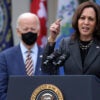Tomorrow is an important day for Obamacare. It’s the deadline for states to declare their intentions about setting up their own health insurance exchanges for residents to purchase insurance under the new regime.
If a state does not set up an exchange, the federal government will come in and set it up, according to the law. So far, 22 states have said they are not going to set up state exchanges. Only six states have received conditional approval from the Department of Health and Human Services (HHS) to operate their own exchanges.
Why leave it up to the federal government? Well, to begin with, it’s an extremely costly undertaking. Heritage health care experts Nina Owcharenko and Ed Haislmaier explain:
[T]here will be no steady flow of federal dollars to the states. The law specifies that starting in 2015, any state implementing a state exchange must develop its own revenue source to fund the exchange’s annual operations. That puts the long-term costs squarely on the states. Moreover, the recent announcement by the Department of Health and Human Services (HHS) that it will levy a 3.5 percent administrative fee on coverage sold through the federally run exchanges indicates there are significant costs if a state agrees to run its own exchange.
And what would be in it for them? Certainly not increased control over how the exchanges are run. Owcharenko and Haislmaier explain that “regulations promulgated by HHS allow states no meaningful flexibility or advantage by operating their own exchanges, relative to a federal exchange. Those states would simply be acting as vendors to HHS.”
As Pennsylvania Governor Tom Corbett (R) said when he announced his decision yesterday, “It would be irresponsible to put Pennsylvanians on the hook for an unknown amount of money to operate a system under rules that have not been fully written.”
Governors also have to decide whether to expand Medicaid to able-bodied, low-income, childless adults in their states. This was something President Obama was counting on:
Congress presumed in PPACA (Obamacare) that the states would agree to build and run exchanges and could be forced to expand Medicaid. The Supreme Court, however, ruled the Medicaid expansion voluntary, which has made states increasingly concerned over new burdens related to costs, control, and coverage—in both the exchanges and Medicaid.
After the Supreme Court ruled that the Medicaid expansion would have to be optional, it threw a wrench into the Administration’s plan. Half of the reduction in the number of uninsured promised under Obamacare was based on mandating that states expand Medicaid. But the federal government would not cover the full cost of the expansion, and state budgets simply cannot take it on.
While governors are supposed to decide on the exchanges by tomorrow, there is no firm deadline for their Medicaid decisions, and the states are still all over the place on that issue.
We are being reminded every day that Obamacare is still a work in progress, and a lot can still go wrong and likely will. These are the problems you face when you try to overhaul one-sixth of the economy in one piece of legislation. HHS is continuing to write the rules of the law, proving as Nancy Pelosi said that we would not know what was in the law until after it was passed. And many parts of it will not be implemented until 2014. As Owcharenko and Haislmaier put it:
With more Americans still opposed to the law than supporting it, the innumerable technical challenges to implementation, and large and uncertain future costs, there is a significant risk that the whole law could unravel, or even collapse, before fully taking effect.
LEARN MORE:
Medicaid Expansion and State Health Exchanges: A Risky Proposition for the States by Nina Owcharenko and Edmund F. Haislmaier
Quick Hits:
- Blue Shield of California is seeking a 20 percent increase in health insurance rates for some policyholders, reports the Los Angeles Times.
- Google Maps are returning to the iPhone following widespread ridicule of Apple’s inferior mapping app.
- Heritage’s Diane Katz warned before Election Day that a regulatory tsunami was coming. The Associated Press reports that it has arrived.
- In any budgeting debate, the White House and lawmakers tend to claim savings where none exist. Here are five budget gimmicks to reject.
- Ready to sound off on Michigan’s right-to-work battle this week? Submit your questions for tomorrow’s Lunch with Heritage hangout.




























